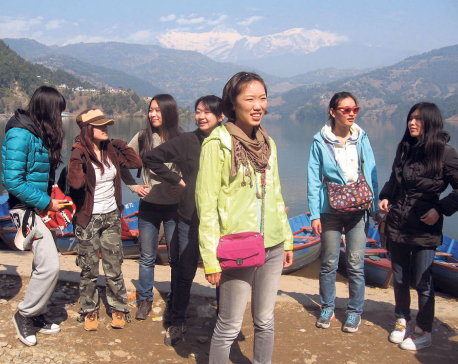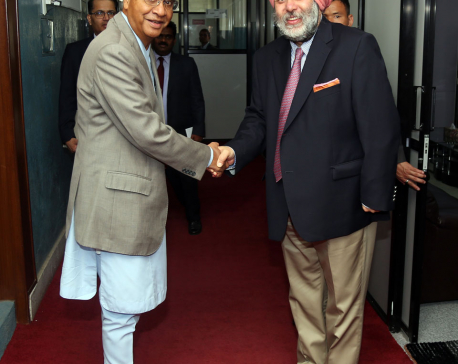
OR

The public perception that India and China are deeply entrenched, that they are busy bribing politicians and pushing sacks of cash to expand influence is excused for our incompetence.
At least once in life everyone has an epiphany so powerful that it reveals a deep fundamental truth. For some, it occurs within a single event, like the momentary brilliance of a flash of lighting against a dark sky. For others, it occurs more slowly, like the drip-drip of coffee percolating into the pot without the slightest hint of what’s coming except for the aroma of freshly brewed coffee wafting through the air.
My epiphany was of the drip-drip kind. It began one afternoon several months ago on a car ride.
We left Tulsipur in Dang district (western Nepal) for Nepalgunj, with the signs of rain still visible on the road. As we headed out of the valley and up the hills, the driver asked for permission to put on Hindi music. I consented without much thought.
The rhythm of Bollywood ripped through the silence. I opened the window. The plains were just coming into view, sprawled like a green carpet dotted with yellow. The trees were lush with the mist still fresh on the leaves. I closed my eyes. The air was in my hair. And the beats of Bollywood pulsated through my veins.
Sheela ki Jawani
Midway through the descent, the hit dance number ‘Sheela ki Jawani’ popularized by the sensationally sexy Bollywood diva Katrina Kaif came on. What else could I do except close my eyes, feel the freshness of the air and imagine Katrina play out Sheela. I could see her floating through the sky, hips swaying to the beat, body arced to accentuate her curves and the occasional bosom thrust that—oh—sends such a bolt through your spine that it makes all men just wanna die.
Many other numbers played on. But in my mind, Katrina danced to every one of them, even those that were probably recorded before she was born. I doubt that I will ever get to meet Katrina Kaif but there was no harm in dreaming, I figured.
In Nepalgunj I checked into the hotel that my bhauju (sister-in-law) had recommended. “It’s a new place, even has a gym,” she had said.
Sure enough. There was a gym and not one, but two restaurants. One Indian and the other oriental. I picked the oriental restaurant for dinner. By the time I had gotten to the bottom of the first page of the menu, dancing Katrina was replaced just as emphatically by a dancing duck.
Peking Duck: Rs 650
I texted bhauju that I had ordered Peking Duck. “You are a brave soul,” she shot back in response.
There was no better way to end the day. I waited excitedly with the duck dancing away in my mind.
I don’t know what Peking Duck tastes like in China. We let the Chinese build our roads, airports and hydro plants. Perhaps we ought to ask them if they would also like to make some Peking Duck while they are here.
A few weeks later the memories of dancing Katrina and the Peking Duck would come gushing back like the Monsoon floods when I heard KP Oli, former prime minister and current chairman of CPN-UML, speak about how Nepal should pursue a policy of “equidistance” from India and China.
I never understood what exactly he meant by “equidistance”. The only time I’ve heard of the policy of equidistance is when a friend was being sought after by two suitors simultaneously. One was a handsome upper-class aristocrat who loved riding motorcycles. The other was an equally handsome son of a wealthy business family who loved riding horses.
My friend understood and practiced equidistance with pizzazz—she entertained both with equal charm till they were both dying to marry her. In the end, she eloped with the local electrician’s son who didn’t care about riding motorcycles or horses but could make her laugh like it was nobody’s business.
I don’t know what Oli meant by “equidistance” but I’m guessing my friend’s story or something akin to it was not what he had in mind.
A few months later, Prime Minister Deuba returned from his state visit to India and was berated for having ‘sold out’ his country. On his arrival, he dashed off immediately to parliament where he served up a long speech in defence of the agreements he had signed and things he had said.
Our foreign policy is in a mess. We struggle to manage our relationships with India and China. This not only prevents us from benefiting from being so well-situated between the two fastest growing economies of the world, it also distracts our domestic politics.
Things so complicated
Our foreign policy need not be so messy or complicated. And this is where my epiphany climaxed. We must learn to benefit from our neighbors instead of wasting time imagining how the two are using us as playground for their interests.
We could, for instance, marry Indian and eat Chinese, if you had my kind of sensibilities. For others, it could be to marry Chinese and eat Indian. Or simply marry both Indian and Chinese, if you fancy; or marry no one at all and just eat Indian and Chinese. There are enough combinations to meet all the Nepali fancies; the important thing, though, is to know what we fancy in the first place and what we want out of these relationships.
Our entire political discourse is marked in terms of either trying to sell out to India or to China. Politicians are marked either as either pro-India or pro-China and some who apparently simply prostitute themselves without principle to the highest bidder.
This type of India or China categorization plays out routinely in our media, in our public discourse and in our everyday banter. This perception holds because of the narrative that we are a victim of broader geopolitics, that we have become a playground for surging Indian and Chinese interests.
We must shed this narrative. India and China are not locked in conflict and are not using Nepal as a pawn. India and China are now both dominant economies, both have clear self-interest and both have agendas. But the idea that they are subtly seeking to outdo the other in Nepal as a way of enhancing their agenda is false and exaggerates our importance.
India and China have one clear interest in Nepal. They both want Nepal to guarantee the safety of the borders. They don’t want Nepal’s soil to be used in anyway against their interests. This should be legitimate interest that we should be able to honor. But beyond that, there is very little Nepal could do to enhance the global aspirations of India or China.
The widely circulated public perception that India and China are deeply entrenched, that they are busy bribing politicians and pushing sacks of cash to expand influence is an excuse for our own incompetence.
We must rise above this sense of being a victim of geopolitics. We must create a new narrative of geopolitics that enhances our interests.
For that we must know what we want. I want to marry Indian and eat Chinese—what do you want?
bishal_thapa@hotmail.com
You May Like This

Service in Chinese for Chinese tourists at TIA
KATHMANDU, Feb 14: Chinese tourists visiting Nepal this year will find the processing at airport immigration easier. They can also wake... Read More...

Indian, Chinese ambassadors call on PM
KATHMANDU, June 16: Ambassadors from India and China for Nepal, Manjeev Singh Puri and Ms Yu Hong respectively today called... Read More...

To eat or not to eat
All of us are waging a war with our bodies. Some of us are trying to kill that body fat... Read More...





Just In
- MoHP cautions docs working in govt hospitals not to work in private ones
- Over 400,000 tourists visited Mustang by road last year
- 19 hydropower projects to be showcased at investment summit
- Global oil and gold prices surge as Israel retaliates against Iran
- Sajha Yatayat cancels CEO appointment process for lack of candidates
- Govt padlocks Nepal Scouts’ property illegally occupied by NC lawmaker Deepak Khadka
- FWEAN meets with President Paudel to solicit support for women entrepreneurship
- Koshi provincial assembly passes resolution motion calling for special session by majority votes







_20220508065243.jpg)






Leave A Comment